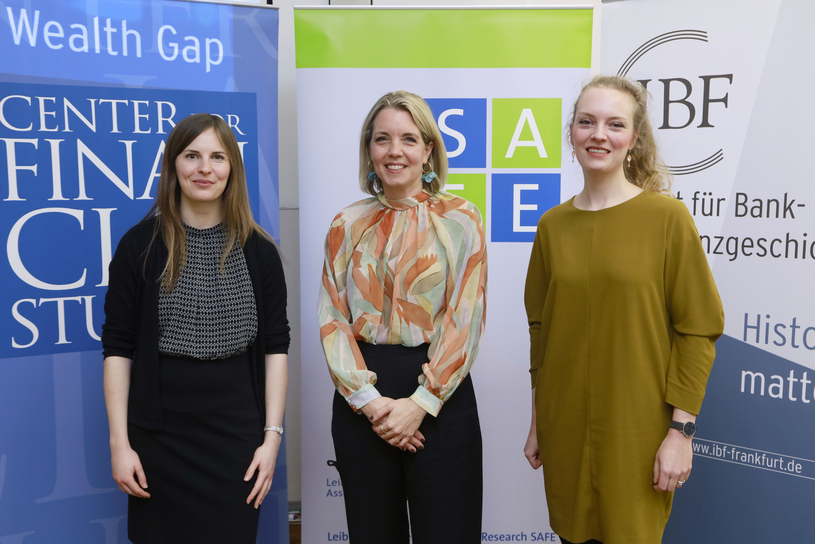Women earn less than men in the same jobs, invest less in the stock market, and are more likely to experience poverty in old age: These are all factors for gender wealth inequalities. To close the so-called "gender wealth gap”, it is important to both remove external restrictions and to specifically bring the topic closer to women. This was made clear at an event at the House of Finance on 22 March 2023.
Organized by the "Frauen mit Format" association, the House of Finance, the Institute for Banking and Financial History, the Center for Financial Studies, and the Leibniz Institute for Financial Research SAFE, three experts, Ilse Munnikhof, Head of Investment Advice at ING Germany, Alina Bartscher, Senior Research Economist at the Danish Central Bank, and Christine Laudenbach, Department Director of Household Finance at SAFE, discussed how women can close existing wealth gaps. Rainer Klump, director of the House of Finance, moderated the event.
More women in the stock market
One important factor is encouraging women to invest their money in the stock market. In this respect, Ilse Munnikhof had some positive news from the German capital market: "In 2022, for the first time, more women were among the new investors," referring to current figures from the Deutsches Aktieninstitut. Nevertheless, the already low proportion of stock savers in Germany is predominantly male.
Christine Laudenbach also confirms: Women participate less in the stock market because they believe they know too little about finance. In scientifically monitored tests, they indeed demonstrate less financial knowledge than men. "Schooling is important to normalize the topic, but it does not need a Ph.D. in finance," Alina Bartscher stated. The panel, therefore, agreed that financial knowledge should be taught in school. The key, however, is that women often do not trust their own financial learnings and assess their abilities as worse than they are. Laudenbach demonstrated this with current research results.
"The feeling of having to know a lot is much more pronounced among women," said the SAFE researcher. This impression is reinforced by stereotypes in the media, she said, when women are portrayed as being less likely to handle money and more naive – in contrast to men, who are shown handling large amounts and being more active. "These stereotypes materialize," Laudenbach said.

Munnikhof described her observation that finance is becoming more presentable among women because they talk about it increasingly with peers and, thus, deal with it more often. This kind of positive influence from the circle of friends can help to overcome shyness about the stock market.
Furthermore, new approaches by the financial industry are necessary: “Women do not feel addressed by securities products for beginners,” Munnikhof reported from practical experience. It is important to address them in a targeted manner and to use the possibilities of digitization for this purpose. Many financial companies could also expand their business this way: “From a company perspective, it makes absolute sense to address this target group,” Munnikhof emphasized. However, it is crucial to understand what works with the new target group, Laudenbach added.
Reforms show numerous positive effects
The reasons for the gender wealth gap are complex. Alina Bartscher showed in her study of the U.S. credit market how serious the impact of restrictions against women in financial matters can be. It was not until the 1970s that reforms like the Equal Credit Opportunity Act (ECOA) led to women no longer having a general disadvantage in borrowing because of their gender. For example, prior to the reforms, only half of a married woman’s income was accepted as collateral when a couple applied for a mortgage in the United States.
According to Bartscher's study, the new laws allowed about 1.4 million married couples to buy homes. In addition, the lifted restrictions created incentives for married women to work. "It can help to remove external restrictions to reduce discrimination among women," Bartscher said. In particular, developing and emerging countries could benefit from laws against gender-based restrictions today, the economist added.
The presentations and lively discussion with the audience showed that the topic is important for academia, industry, and society. While women seem to be more engaged with financial issues today, many hurdles and stereotypes still need to dissolve to truly equalize wealth between the genders.

